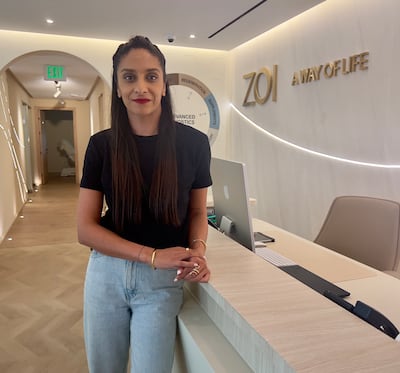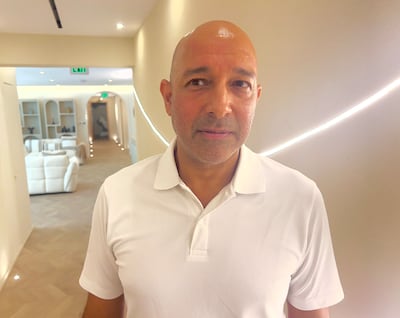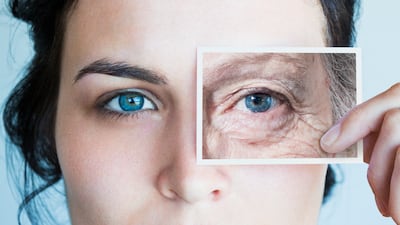An anti-ageing clinic in Dubai has opened its doors with the claim that it can take ten years off the biological age of those enrolling in customised longevity programmes.
In an era of longevity science, doctors and health practitioners are exploring ways to extend the health span of populations, with clinics now tapping into the emerging industry of long life.
While Asian nations dominate the longest lifespan of their inhabitants, other nations are beginning to catch up as more is learnt about how to live well into old age.
In Hong Kong and Japan, citizens reach an average age of about 86, while those in Singapore and South Korea are likely to reach 85.
chief executive of Smart Salem
European nations generally lag behind (Switzerland leads the way there with an average age of 85).
The business has become so lucrative, that a $111 million prize has been launched in the US challenging scientists to develop a single treatment capable of reversing ageing by 20 per cent.
The X Prize announced by tech tycoon Peter Diamandis, 63, will be awarded to any company that can delay the biological clock, by reducing the effects of ageing on immune function and cognivite and muscle performance.
Clinics are now looking to benefit from the lessons learnt in those nations, by offering longer life to their clients – for a price.
A 12-week course at the data-driven Zoi-Me longevity clinic in Jumeirah costs about Dh15,000, and promises to reduce someone’s biological age by 2-3 years.
More expensive, long-term executive programmes cost around Dh100,000 and claim to go even further by reducing biological age by up to a decade.
At the Aviv Clinic in Dubai, hyperbaric oxygen therapy courses sell from Dh10,000, but clients can pay into the hundreds of thousands of dirhams to achieve long term goals. By regenerating stem cells, flooding the blood with oxygen and generating new blood vessels, treatments stall the onset of ageing.
The industry of longevity aims to deliver a new brand of healthcare, focused on preventive measures to head off life-limiting illnesses and diseases.
Testing at the Zio-Me clinic offers blood and biomarker tests, genetic and metabolic evaluations and a bone density scan, which the clinic’s founder Harjit Bahia says has the potential to change someone’s biological age.
“Quite often we talk about lifespan, which is the number of years you will be alive, but what matters most is how many of those years can we maximise health?” said Ms Bahia, a former clinical breast cancer pharmacist.
“We have the framework of seven pillars that ultimately looks at expanding and lengthening the health span of our clients.
“We can actually change somebody's biological age, and there's a number of ways in which we do that.”
Biological age
To understand what is exactly going on inside the body, blood and biomarker testing is done to develop a specific improvement programme.
By examining the length of telomeres – the protective caps on the end of chromosomes inside every bodily cell – an aging test, or methylation test, can be done to determine biological age. Results indicate how quickly cells are aging.

“Along with lifestyle factors, and provided we do them with the level of precision that comes from the data-driven approach we take, we can slow down that rate of aging,” said Ms Bahia.
“We will never do an intervention, prescribe a workout, eating pattern or reassess sleep without that information.”
Geneticists at Stanford University in California found aging is not a steady decline, with two periods of rapid change seen in people in their mid-forties and again in their sixties. Thousands of molecules were assessed from skin and blood samples of 108 people aged 25-75 across seven years, to see how the body processed alcohol and inflammation.
Researchers also evaluated microbiomes, such as bacteria, fungi and viruses, that lived inside the body.
The first wave of rapid aging, at bout 44, underwent changes related to the risk of cardiovascular disease and the ability to process alcohol, caffeine and fats. In the second wave of change, molecules related to immunity, metabolism and kidney function deteriorated. The results encouraged scientists to suggest lifestyle changes should be made during periods of good health, to help withstand periods of rapid aging and functional decline.
Three-month test
An early trialist at the Zoi-Me clinic is Nick Borkhataria, 53, who is vice president of brand partnerships at noon.com.
He enrolled in a 12-week improvement programme after the death of his father, Kishor, in February from cancer aged 78.
“Dad's diagnosis really put a lot of thought in my mind about what I could do to remain healthier, for longer,” said Mr Borkhataria.
“Being 53, and having two young boys, my thoughts around mortality really kicked in.
“I thought about lifestyle changes, a personal trainer or dietitian, as I want to see both my sons take advantage of me living longer.”

Two weeks into the programme, he has already completed several tests to assess his biological age, including a comprehensive full-body diagnostic and baseline exercise to set actionable, measurable milestones.
Bi-weekly 90-minute gym sessions and a healthy eating programme are just the beginning of his three-month programme, which will focus on seven pillars of life: nutrition, movement, sleep, regeneration, supplements, aesthetics and stress.
Another trialist, seven weeks into the programme, said their biological age had reduced from 55 to 53, according to clinical tests.
“As I get older, I'm realising I want to remain stronger so I can enjoy my son being 14,” said Mr Borkhataria, who weighs 85kg, quit smoking in 2020 and aims to cut back on alcohol and sugary foods.
“I want to be around to enjoy my future grandchildren, even for just a few years, that's the mission I'm on.”
The longevity industry is big business, as is emerging healthcare services to detect predispositions to head off illness and disease.
According to the Allied Market Research group, longevity and anti-senescence therapies that lessen symptoms of aging were worth $25.1bn in 2020, and are expected to reach $44.2bn by 2030.
Microbiome testing of gut health at Smart Salem clinics in Dubai can determine how inflammation may be increasing someone’s age.
It is one of several preventive tests at the medical centres in DIFC, City Walk and Dubai Knowledge Park.
Testing takes about four weeks to complete and generates a report to understand microbial diversity, digestive potential, microbial metabolites and eukaryotic microorganisms as well as specific nutritional recommendations to improve gut health.
The test costs around Dh2,500 and could provide vital clues in how to live healthier, for longer.
Gut health
“A healthy gut is crucial to your immune system, however until recently it was difficult to get an in-depth view of individual gut health to identify microbial imbalance,” said Smart Salem’s clinical dietitian, Helen Conway.
“With this advanced testing, we can help people protect and enhance their gut microbiome in a sustainable way, with significant impacts to their overall health and well-being. This is really exciting.”
The medical centres offer a more complete DNA analysis for about Dh3,500.
By applying AI-powered whole genome shotgun sequencing, the test provides valuable insight into overall well-being and the potential for gut genes to influence health positively and negatively.
“The data we're getting from our gut can improve our health, as about 70 per cent of your immune system lives in your gut,” said Amanda Gravitis chief executive of Smart Salem.
“Two-thirds of people suffer from gut-related issues, by improving your gut health you can actually improve your immune system, your heart health, nervous system and kidney and liver function.
“When you start talking about longevity, people think of IV drips, red light therapy or oxygen chambers and hyperbaric chambers.
“Many of them have a place, but the starting point is screening.”
Simple lifestyle changes such as healthier diets, much like Japan, where fish and rice are popular choices, engaging in physical activity such as in Switzerland, where hiking and skiing are prominent, or reducing alcohol intake, could reduce multiple health issues, increasing life expectancy.
“We were not originally a longevity clinic, but these services are game changers in the world of prevention and proactive health screening,” said Ms Gravitis.
“Previously, it's been very expensive and results have taken a really long time, but that is changing, thanks to Ai.
“Our focus is very much on that shift to a more preventive approach.”


